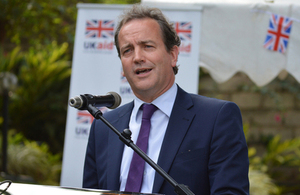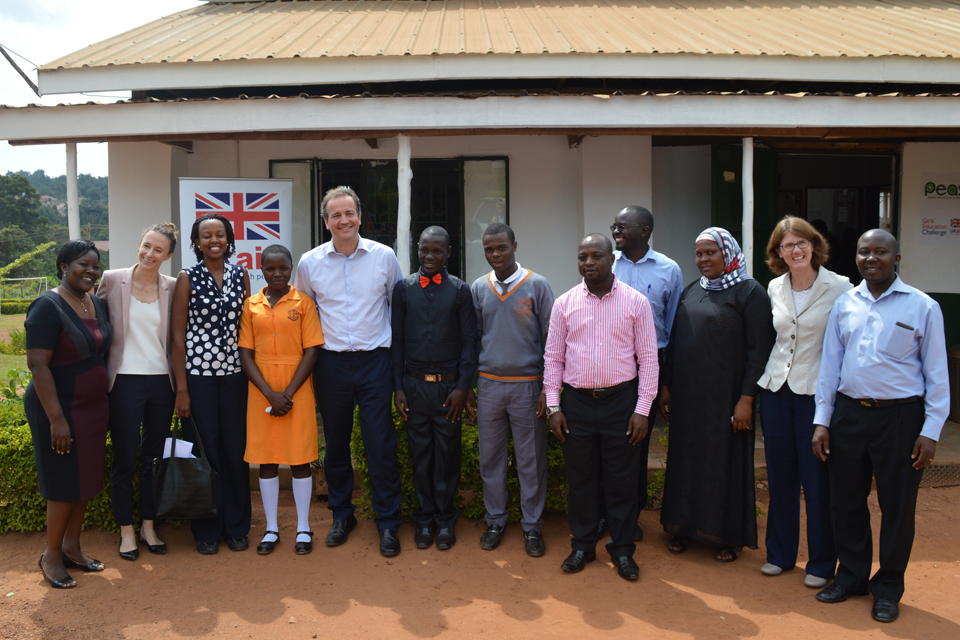UK Development Minister Nick Hurd visits Uganda
The minister saw at first hand UK development projects and initiatives in Uganda.

Permanent Under Secretary of State for International Development, Nick Hurd MP
On 15 and 16 June 2016, the Permanent Under Secretary of State for International Development, Nick Hurd MP made his first visit to Uganda. During his visit he had the opportunity to meet with various partners and to see first-hand some of the development challenges the UK government is supporting Uganda to address.
Throughout his visit, the minister emphasised the important role that Uganda plays in supporting stability in the region as well as hosting over half a million refugees. He stressed that UK support to Uganda to underpin prosperity and stability remains firmly in both Uganda and the UK’s national interests.
With almost 50% of Uganda’s population under 15 years old, young people formed a significant part of the visit. On arrival in Uganda, the minister met Uganda’s First Lady, Janet Museveni, who has recently been appointed Minister of Education and Sports. They discussed the challenges facing the education sector. Later, the Minister had an opportunity to visit a secondary school, supported and run by the Promoting Equality in African Schools (PEAS) network - a UK non-profit operator of low-cost secondary schools. Through the Girls’ Education Challenge, DFID is supporting PEAS to improve the learning outcomes and aspirations of its students, in particular girls. Many young girls in Uganda are forced to drop out of school early, in part due to social norms about educating girls.

Minister Nick Hurd MP at Onwards and Upwards Secondary School which is a school supported by Promoting Equality in African Schools (PEAS) network - a UK education charity.
The minister also visited a slum on the outskirts of the capital city Kampala where he met with young people struggling to find employment and live a decent life. They discussed the challenges to accessing reproductive health (including family planning) services and the difference an innovative outreach programme funded jointly by DFID and USAID is making in their community. By bringing services closer to the community and working with the youth as agents of change, more young people are learning about how to prevent HIV/AIDS and unwanted pregnancies. More young people can now access quality family planning services that would otherwise have been beyond their reach. This is helping them to choose when to have children.

Nick Hurd MP and DFID Uganda Head of Office Jennie Barugh in Bwaise, Kampala with beneficiaries of a Marie Stopes outreach programme funded jointly by DFID and USAID.
Access to energy is another major challenge in Uganda. With just 15% of the population connected to the grid, lack of access to electricity risks restricting growth and job creation. A UK Government supported programme, GET FiT, has helped to develop a standard agreement for power companies and provides incentives for the first five years of operation. This has helped to attract nearly $500m in investment to 20 new renewable energy power plants which will add 20% more generating capacity. During his visit, the Minister signed an Energy Access Partnership with the Minister of Energy which will reinforce the UK’s work in the energy sector in Uganda through support to the off grid energy revolution.

UK International Development Minister Nick Hurd MP and Energy and Mineral Development Minister Hon Irene Muloni after signing an Energy Access Partnership agreement.
Following a discussion about opportunities to tackle corruption in Uganda, the minister ended his visit at a “marketplace” event, accompanied by the Minister for Relief, Disaster Preparedness and Refugees, Mr Hilary Onek. UN agencies and other humanitarian actors showcased a range of technological and innovative solutions to address protracted crises and promote of self-reliance in responding to the unprecedented refugee caseload and vulnerable population in the Karamoja region of NE Uganda. These included improved agriculture practice, real time data monitoring to inform planning, monitoring and response, the provision of clean energy as well as strengthened social service participation and delivery. The minister learned how Uganda is uniquely placed to implement the Wilton Park Principles and commitments made at the World Humanitarian Summit through its progressive policies.

Minister Nick Hurd MP and Minister for Relief, Disaster Preparedness and Refugees, Mr Hilary Onek at a “marketplace” event at which different exhibitors showcased a range of technological and innovative solutions to address challenges faced by refugees in Uganda.
He also saw how UK bilateral and centrally managed support is being used to share lessons across contexts in order to address protracted crises and build durable solutions while continuing to meet immediate, emergency needs.